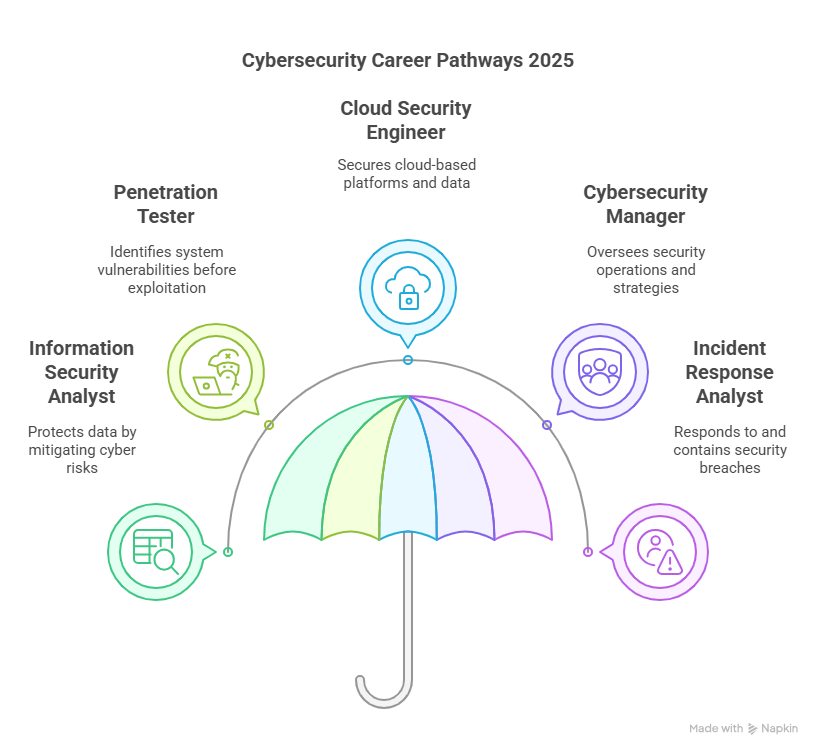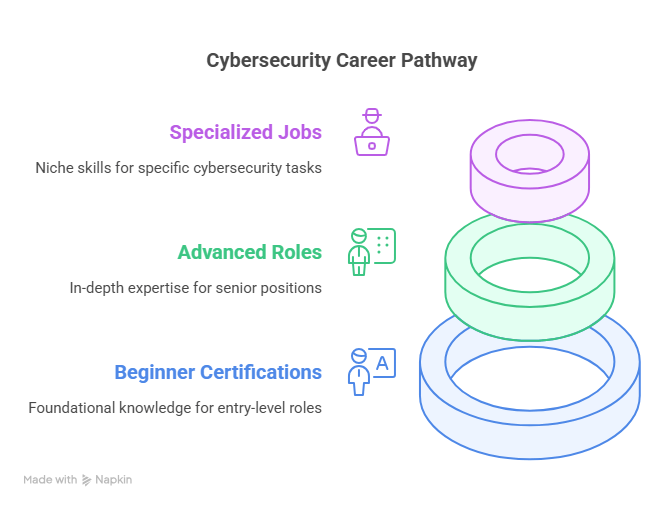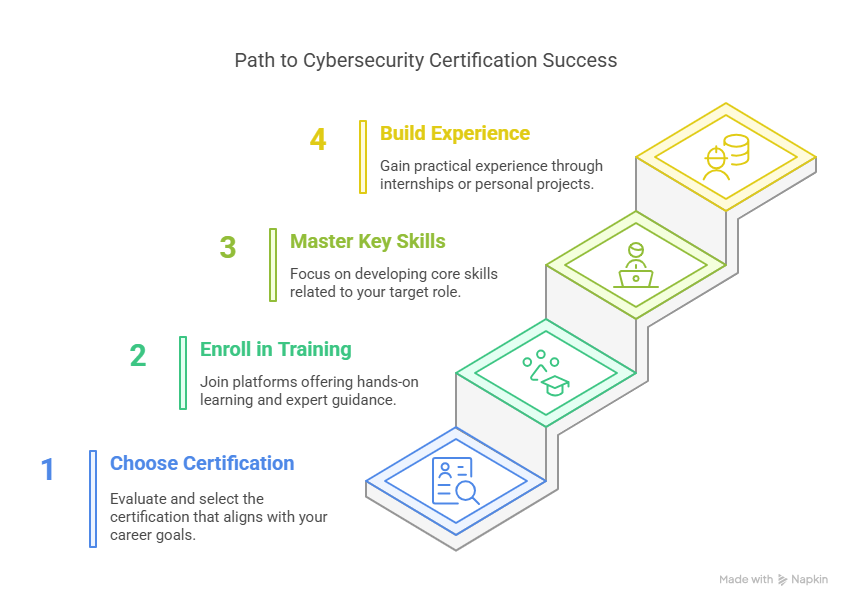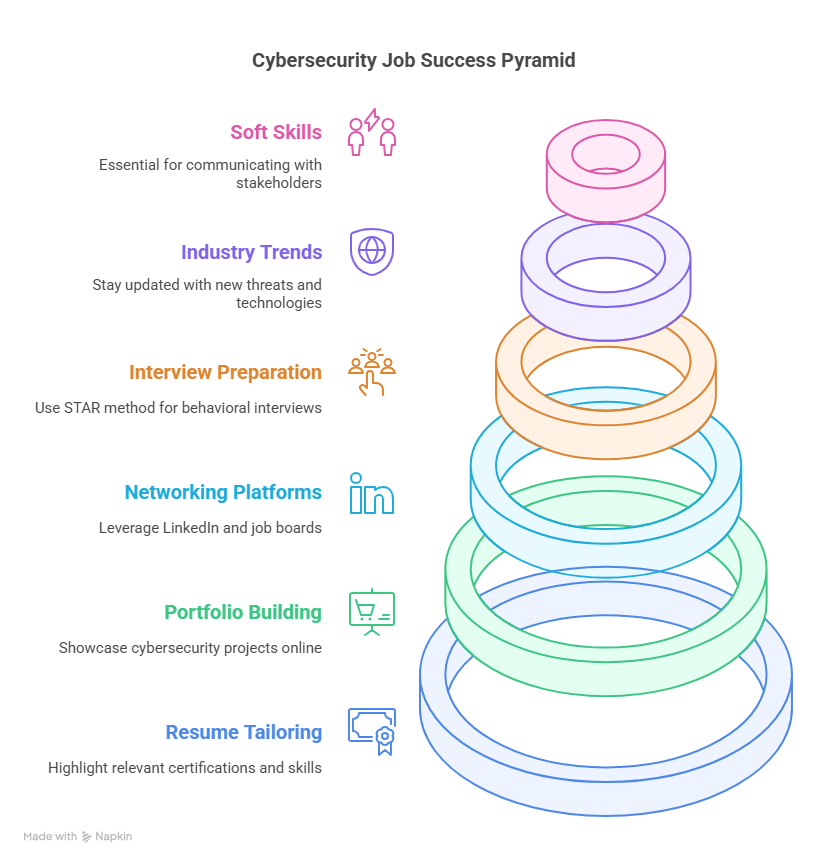Table of Contents
- Why Cybersecurity Certifications Are Essential for Career Success
- Top Cybersecurity Certification Jobs in 2025
- How Certifications Align with Job Roles
- How to Prepare for Cybersecurity Certification Jobs
- Helpful Tips for Securing Cybersecurity Certification Jobs
- Recommended Resources for Cybersecurity Jobs
- Final Thoughts: Your Path to Success in Cybersecurity
- FAQ Section: Cybersecurity Certification Jobs
The rapid rise in cyber threats has made cybersecurity one of the most critical fields in today’s digital environment. As technology evolves, so do the threats we face, and businesses are increasingly looking for professionals who can protect sensitive data and defend against cyberattacks. It Specialist Cybersecurity Certification has become a key asset for anyone looking to break into this lucrative and impactful field. Cybersecurity certifications have become essential for anyone seeking to demonstrate their expertise and readiness for such roles. This guide explores the top cybersecurity certification jobs available in 2025, the importance of certifications, and the best ways to prepare for these roles. Additionally, platforms like ACSMI’s 400+ certification modules offer tailored resources that help you build practical skills and take your career to the next level.
Why Cybersecurity Certifications Are Essential for Career Success
Cybersecurity certifications are more than just qualifications; they are a clear indicator to employers that you have the knowledge and skills to safeguard organizational data. Here’s why they are indispensable for anyone pursuing a career in cybersecurity:
-
Enhanced Credibility: Certifications validate your technical skills and make your resume stand out in a competitive job market.
-
Broadened Career Options: Certain certifications provide access to specialized roles, such as ethical hacking and cloud security, expanding your career possibilities.
-
Higher Earning Potential: Certified professionals often command higher salaries compared to their non-certified counterparts.
-
Global Opportunities: Certifications are recognized internationally, opening doors for job opportunities across the globe.
Top Cybersecurity Certification Jobs in 2025
The demand for skilled cybersecurity professionals continues to grow, and earning the right certifications can help you secure high-paying and rewarding roles. Below are some of the most sought-after cybersecurity certification jobs for 2025.

1. Information Security Analyst
What They Do: Information Security Analysts protect an organization’s data by identifying and mitigating cyber risks. They implement security protocols, conduct risk assessments, and manage data protection strategies.
Recommended Certification: CompTIA Security+, CISSP
Average Salary: $107,580 annually (US)
Growth Potential: High, with a 35% increase in demand expected by 2030.
2. Penetration Tester (Ethical Hacker)
What They Do: Ethical hackers simulate real-world attacks to find vulnerabilities in systems. They use penetration testing tools and techniques to identify weaknesses before malicious hackers can exploit them.
Recommended Certification: CEH, OSCP
Average Salary: $125,000 annually (US)
Growth Potential: Critical, as cybercrime continues to rise.
3. Cloud Security Engineer
What They Do: Cloud Security Engineers are responsible for securing cloud-based platforms and ensuring that organizations’ data stored in the cloud is safe from attacks.
Recommended Certification: CCSP, Microsoft Certified – Azure Security Engineer Associate
Average Salary: $130,000 annually (US)
Growth Potential: Strong, as cloud computing continues to dominate the business world.
4. Cybersecurity Manager
What They Do: Cybersecurity Managers oversee the security operations of an organization and lead teams of cybersecurity professionals. They develop strategies to protect company data and manage security protocols.
Recommended Certification: CISSP, CISM
Average Salary: $140,000 annually (US)
Growth Potential: Strong leadership demand, especially as companies scale their cybersecurity operations.
5. Incident Response Analyst
What They Do: Incident Response Analysts detect and respond to security incidents in real time. They work to contain breaches, investigate their causes, and implement recovery strategies.
Recommended Certification: CompTIA CySA+
Average Salary: $99,000 annually (US)
Growth Potential: Vital for organizations handling sensitive data or high-value assets.
How Certifications Align with Job Roles
Cybersecurity certifications play a significant role in determining which job roles are attainable. Here’s how they align with various positions:

1. Beginner-Level Jobs
For those just entering the field, certifications like CompTIA Security+ and Certified Cybersecurity Technician (CCT) are excellent starting points. These certifications enable you to qualify for roles like Security Analyst or Junior Penetration Tester, where foundational knowledge of cybersecurity principles is key.
2. Advanced Roles
For more senior positions such as Cybersecurity Manager or Security Architect, a CISSP certification is often required. These roles demand in-depth knowledge of risk management, compliance, and decision-making skills.
3. Specialized Jobs
Certifications like CCSP and CEH prepare professionals for specialized roles like Cloud Security Engineer or Ethical Hacker. These positions require niche knowledge, such as cloud security measures or advanced penetration testing techniques.
How to Prepare for Cybersecurity Certification Jobs
Successfully landing a cybersecurity certification job requires more than just passing exams. Here’s how to properly prepare for these high-stakes roles:

1. Choose the Right Certification
Start by evaluating which certification aligns best with your career goals. If you’re a beginner, start with foundational certifications. If you’re a seasoned professional, aim for advanced or specialized certifications.
2. Enroll in Training Platforms
Training platforms like ACSMI offer hands-on learning tools, simulated labs, and expert guidance. For practical certifications like OSCP and CEH, ACSMI’s modules can significantly enhance your skills and prepare you for the real-world challenges you’ll face.
3. Master Key Skills
Focus on mastering core skills related to your target role. For example, if you’re pursuing a Penetration Tester role, you’ll need to practice penetration testing techniques, vulnerability analysis, and ethical hacking.
4. Build Experience While Studying
While certifications, like the Cybersecurity Certification Test, are essential, employers also value practical experience. Look for internships, entry-level roles, or personal projects to build your hands-on expertise.
Helpful Tips for Securing Cybersecurity Certification Jobs
Securing a job in cybersecurity is about more than just having the right certifications. It’s also about how you present yourself and your skills. Here are some actionable tips:

1. Tailor Your Resume
Ensure your resume highlights relevant certifications and skills. Create a dedicated section at the top of your resume for certifications such as CISSP, CEH, or CompTIA Security+. Use bullet points to show how your certifications relate to the job.
2. Build a Portfolio
Having a portfolio of practical work can significantly boost your candidacy. Create a GitHub page or personal website to showcase cybersecurity projects, such as penetration testing reports or incident response strategies.
3. Use Job Boards and Networking Platforms
Leverage platforms like LinkedIn, Indeed, and specialized boards like CyberSecJobs.com. Update your profile to reflect your certifications and join relevant cybersecurity groups to increase your visibility.
4. Prepare for Behavioral and Technical Interviews
Behavioral Interviews: Use the STAR method (Situation, Task, Action, Result) to answer questions about challenges you’ve faced in past roles.
Technical Interviews: Be ready to discuss specific skills like vulnerability scanning, risk mitigation, or system hardening. Practice using platforms like ACSMI for simulated challenges.
5. Stay Current with Industry Trends
Cybersecurity is an ever-evolving field. To stay competitive, regularly read cybersecurity blogs, attend webinars, and participate in industry events to keep up with new threats and technologies.
6. Don’t Ignore Soft Skills
Strong communication, teamwork, and problem-solving skills are critical in cybersecurity roles, especially when explaining complex security issues to non-technical stakeholders.
Recommended Resources for Cybersecurity Jobs
-
Resume Builder Tools: Platforms like Zety and Canva offer IT professional-specific templates.
-
Mock Interview Platforms: Use Big Interview or Pramp to practice behavioral and technical interviews.
-
ACSMI: ACSMI’s modules include interview-focused labs, practice problems, and career readiness resources.
-
Job Search Sites: Explore Dice, CyberSecJobs.com, and ClearanceJobs for roles suited to cybersecurity certifications.
Final Thoughts: Your Path to Success in Cybersecurity
Cybersecurity certification jobs offer exciting opportunities with strong career growth potential. Whether you’re aiming for an entry-level position or looking to advance to a leadership role, the right certifications—such as CEH, CISSP, and CCSP—can open doors to a lucrative and fulfilling career.
Platforms like ACSMI provide practical, hands-on learning opportunities that complement certification programs, helping you prepare for real-world challenges and ensure long-term career success.
It’s time to certify, apply, and thrive in your cybersecurity career. The future is bright for certified cybersecurity professionals—seize the opportunity today!
FAQ Section: Cybersecurity Certification Jobs
1. What are the best cybersecurity certification jobs for beginners?
Entry-level roles like Information Security Analyst and SOC Analyst are ideal for beginners. Starting with certifications like CompTIA Security+ will help you land these positions.
2. How much can I earn with cybersecurity certification jobs?
Entry-level salaries start at around $70,000 annually. Advanced roles like Cybersecurity Manager or Penetration Tester can pay upwards of $140,000 annually.
3. Which certifications are best for ethical hacking jobs?
CEH (Certified Ethical Hacker) and OSCP (Offensive Security Certified Professional) are the top certifications for ethical hacking roles.
4. Are there remote jobs available for certified cybersecurity professionals?
Yes! Many roles like Cloud Security Engineer and Cybersecurity Consultant offer remote work options.
5. Are hands-on skills important for cybersecurity certification jobs?
Absolutely. Many roles require proof of practical skills, especially in fields like penetration testing. Certifications like OSCP, which emphasize hands-on labs, are especially beneficial.

Leave a Reply